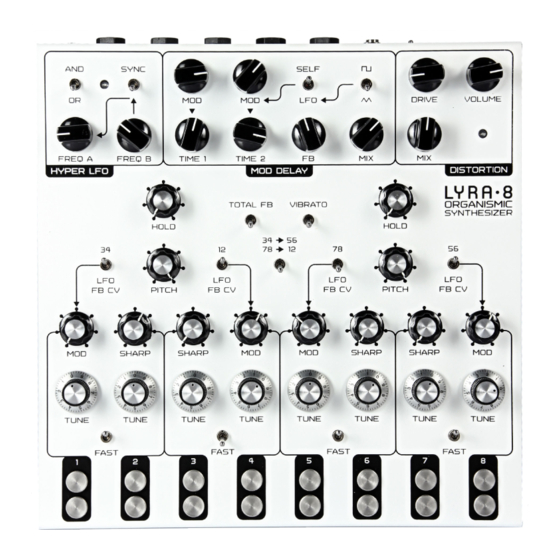
Advertisement
Quick Links
Advertisement

Summary of Contents for SOMA LYRA-8
- Page 1 USER MANUAL...
- Page 2 LYRA•8 USER MANUAL STRUCTURE LYRA is based on eight generators, which will be referred to as voices. Their design is not like a traditional subtractive synthesis VCO. Instead of having a linear or logarithmic dependency on control voltage, they resemble the tone generators in old electric organs. Hence the use of "voices"...
-
Page 3: Controls Description
USER MANUAL LYRA•8 CONTROLS DESCRIPTION VOICES SECTION Sensors 1...8. Consist of a pair of contacts each. The upper contact is sensitive, the lower is the control voltage. Put your finger between the contacts to close the circuit with your body's conductivity. The current is very low, several orders below sensitivity threshold, and is absolutely safe:-) The sensors launch envelope generators for each voice. - Page 4 LYRA•8 USER MANUAL HOLD function. Flipping up and down the Fast switch can be used to cut short the decay of a sounding voice, sooner than its release ends. When the FAST switch is in upper position, it only takes a light stroke to trigger a voice with the sensor. The TUNE knobs set the pitch of the voices.
- Page 5 USER MANUAL LYRA•8 The VIBRATO switch turns on vibrato for all voices. Each voice has its own unique vibrato frequency, as there are eight independent vibrato generators in the instrument. HYPER LFO SECTION FREQ A and FREQ B: Two operators for synthesis of a complex LFO. They're two simple LFOs, in essence.
- Page 6 LYRA•8 USER MANUAL MOD DELAY SECTION The TIME 1 and TIME 2 knobs set the delay time for each line. The MOD knobs set the modulation depth for a given delay line. The SELF/LFO switch: With the switch up, the delay time is modulated by its own output signal;...
-
Page 7: Power Switch
USER MANUAL LYRA•8 CONNECTIONS PHONES: For headphones with a resistance of 8 to 64 Ohm. OUT: A balanced mono output. Works as a typical TS jack output in unbalanced mode; can also be connected via an XLR adaptor directly to a multicore. This eliminates the need for DI boxes, which, if passive, can degrade the signal's bass and sub-bass. - Page 8 LYRA•8 USER MANUAL MASTERING THE INSTRUMENT LYRA was conceived as a unique, fully-fledged instrument with controls and playing tech- niques all its own. Its knobs and switches are not mere parameter controls to set-and-forget, they are hands-on musical controllers meant to be played in real-time. Particularly so, the TUNE, PITCH, MOD, TIME 1, TIME 2, FB knobs and the FM structure switches.
- Page 9 USER MANUAL LYRA•8 Try going to the organ mode by switching the modulation source switches to the middle, and back to the FM. Add HOLD and play with the knobs only (Lyra will now act as a drone synthesizer). Try using one voice group as a drone (HOLD on), and another for solo (HOLD off). Step 3.
- Page 10 LYRA•8 USER MANUAL LYRA'S HISTORY AND PHILOSOPHY I have spent many years exploring the brain and nervous system of the living organism. One of the things I wanted to understand was how and why a several-hundred-neuron nervous system in the smallest of insects and the simplest of animals is capable of pro- ducing the complex and multifaceted behaviour that our most powerful computers still fail to model today.
- Page 11 USER MANUAL LYRA•8 I rewound the history of synth schematics to the beginning and took some of the most archaic and rawest solutions. My intention was to give the player maximum control over the generated sounds, with minimal quantization or automation. I've made a complete stage-ready instrument where any position of controls creates a good soundscape.
-
Page 12: Specifications
LYRA•8 USER MANUAL SPECIFICATIONS Max output voltage ..........2 v 0-to-peak Output connector . - Page 13 The word SOMA is an abbreviation from SOund MAchines. SOMA is also a psychedelic ritual drink used in ancient vedic (Indian) culture, as well as in Iranian (known as Haoma) and Persian ancient traditions. The drink is mentioned in the ancient East's sacred books, e.g.
- Page 14 Manual version 1.0 04/2017. Made in Russia...


Need help?
Do you have a question about the LYRA-8 and is the answer not in the manual?
Questions and answers